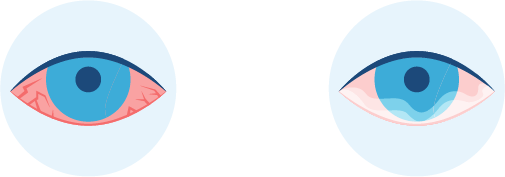Table of Contents
Your eyes are important sensory organs that you constantly use to make sense of the things going on around you. So when your eyes feel gritty, dry, and as though there's an ongoing irritation, it's hard to ignore.
If you find yourself dealing with eyes that are constantly scratchy, red, and irritated, you may be experiencing dry eye syndrome. The causes of dry eyes can vary widely, ranging from your age to the amount of time you spend staring at a computer screen. But no matter how you begin to develop those symptoms, living with eyes that are never comfortable can impact your quality of life.
 You can use artificial tears and eye drops to bring temporary relief to those dry eyes, but there may be another option: omega-3 supplements*.
You can use artificial tears and eye drops to bring temporary relief to those dry eyes, but there may be another option: omega-3 supplements*.
Supplementing your diet with essential omega-3 fatty acids, like those found in fish oil pills, has been linked to a wide range of potential health benefits ranging from a healthy brain to a healthy heart.* As it turns out, there’s evidence that taking fish oil for dry eyes may also help minimize some of the causes of dry eyes at the source*!
What Is Dry Eye Disease?
 Dry eye disease, otherwise known as dry eye syndrome or simply “dry eyes,” is a condition characterized by dry, itchy, and uncomfortable eyes. It can also present itself in other forms, like eyes that are constantly watery, red, or overly sensitive to light. Dry eyes can even impact your ability to wear contact lenses and affect your vision.
Dry eye disease, otherwise known as dry eye syndrome or simply “dry eyes,” is a condition characterized by dry, itchy, and uncomfortable eyes. It can also present itself in other forms, like eyes that are constantly watery, red, or overly sensitive to light. Dry eyes can even impact your ability to wear contact lenses and affect your vision.
This syndrome usually occurs when your eyes don’t produce enough tears (or if they produce poor-quality tears). Under normal circumstances, the tears in your eyes form a film that rehydrates your eyes every time you blink. When this doesn’t happen, it can lead to irritated, tired, and painful eyes.
It’s a relatively common issue: While there’s no exact data on just how many people experience this frustrating condition, it’s estimated that up to 49 million Americans deal with dry eyes.
Several factors are thought to contribute to dry eye development, according to the American Optometric Association. For example, females tend to experience dry eye disease more frequently than men due to hormonal changes from pregnancy, menopause, or contraceptives. Your risk of developing dry eye disease can also increase as you age, with most people over 65 experiencing it in some form.
In addition, you might develop dry eyes from:

- Certain medications
- Inflammatory conditions
- Dry, smoky, or windy environments
- Extended exposure to computer screens
How To Deal With Dry Eye Disease
 Since some of the major causes of dry eyes are environmental, you may be able to have some degree of control over how they affect your comfort and vision. For example, limiting your screen time and staying inside or away from smoke and wind could potentially improve some milder cases of dry eye.
Since some of the major causes of dry eyes are environmental, you may be able to have some degree of control over how they affect your comfort and vision. For example, limiting your screen time and staying inside or away from smoke and wind could potentially improve some milder cases of dry eye.
However, this is not going to be the most suitable solution for every dry eye situation. In these cases, you may need to seek a different solution.
Some of the most common methods for dealing with chronic dry eyes include eye drops and artificial tears. These liquid ointments are applied directly to your eyeballs, which introduces moisture and can help bring temporary relief to dry itchy eyes.
However, some people who want to fight the causes of dry eyes at the source may find that an omega-3 supplement like fish oil may help.*
How An Omega-3 Supplement Can Help Dry Eyes
Fish oil pills are a rich source of omega-3s, a type of essential fatty acid you get from your diet. Omega-3s are one of the most commonly taken dietary supplements around the globe, in part because they have been found to have an anti-inflammatory effect and may support healthy brains and cardiovascular systems.*
Inflammation is part of your body's immune response to protect you from harm. If your body detects an injury, it increases the blood flow to the affected site and releases chemicals to neutralize the threat. This is a good response under normal circumstances since it works to keep your body healthy, but when it happens inappropriately, it can lead to various health concerns, including dry eyes.
So, in addition to general health benefits, the potential anti-inflammatory effect of omega-3 fatty acids means that eye doctors often recommend them as part of a regimen to help with dry eye syndrome.*
There are two different kinds of dry eye disease:
- Aqueous deficient, in which your eyes don’t produce enough tears.
- Evaporative, where your tears evaporate before being able to hydrate your eyes. This is often caused by your meibomian glands, which provide the oils needed for your tear film. If your tears have less oil than normal, they are more prone to evaporating early.
No matter the cause of your dry eyes, issues are thought to be linked (at least in part) to inflammation of the tissues and glands around the eye.
For example, inflammation of the tear ducts and cornea might affect your tear production, leading to aqueous deficient dry eyes. Similarly, inflammation of the meibomian glands can decrease the production of the fatty oils necessary to lubricate your eyes.
This can also lend itself to a cycle of inflammation that makes dry eyes much worse. Our eyes can become inflamed from minor injuries like dust, debris, and wind. This leads to decreased tear production, so our tears can't help wash away these "intruders." They then stay in the eye, causing even more injury to our eyes and spurring more inflammation.
So because omega-3s are thought to help decrease inappropriate inflammation, taking fish oil for dry eyes may be helpful for those who experience these uncomfortable symptoms.*
 One study found that taking omega-3 supplements helped to improve the fatty acid content of teras. In other words, the people in the study who supplemented their diet with omega-3 supplements saw improvement in their tear quality! This improvement in tear quality could potentially help rehydrate some dry eyes and decrease irritation, which could then help prevent further inflammation.*
One study found that taking omega-3 supplements helped to improve the fatty acid content of teras. In other words, the people in the study who supplemented their diet with omega-3 supplements saw improvement in their tear quality! This improvement in tear quality could potentially help rehydrate some dry eyes and decrease irritation, which could then help prevent further inflammation.*
The DREAM Study
It’s important to note that fish oil might not be the cure-all for dry eye disease and that the research around its benefits is still being debated. One prominent study has led to suggestions that it might not help dry eyes at all.
The Dry Eye Assessment And Management Study (DREAM) was a study funded by the National Eye Institute and sought to understand the role that omega-3s played in dry eyes. Participants with dry eyes were given either a high-dose omega-3 supplement or a placebo olive oil pill to be taken daily in the study. After a year, researchers found that the people who took the omega-3 supplement didn't significantly improve their dry eye symptoms versus the participants who took the placebo.
So this study suggests that omega-3 supplements might not necessarily be the miraculous answer to dry eyes that some might think.
However, that’s not to discredit omega-3 supplements completely. Remember, there is still evidence that omega-3s can reduce inflammation to improve tear quality and minimize excessive blood flow to the eyes. So it could still help with reducing those uncomfortable symptoms - but since the research is still somewhat controversial, you shouldn't rely on omega-3s on their own for dry eye symptoms.*
If you do want to try an omega-3 supplement to see whether it will help with your dry eyes, make sure to consult with your doctor and/or an ophthalmologist first.
What Are The Best Fish Oil Supplements For Dry Eyes?
 There are three different kinds of omega-3 fatty acids that you can find in your diet and your supplements: EPA, DHA, and ALA.
There are three different kinds of omega-3 fatty acids that you can find in your diet and your supplements: EPA, DHA, and ALA.
Eicosapentaenoic acid (EPA) and docosahexaenoic acid (DHA) can be thought of as the “active” omega-3 fatty acids that you want to include in your diet. Both of these omega-3 fatty acid types have been shown to have those anti-inflammatory properties you want if you’re looking for a solution for dry eyes.* These kinds of fatty acids are found best in supplements from marine sources.
On the other hand, alpha-linolenic acid (ALA) is an omega-3 fatty acid most commonly found in plant-based foods and supplements, including chia seeds, walnuts, and flax seeds. While ALA is more suitable for plant-based eaters and people who can’t eat fish or crustaceans, it needs to be converted to the “active” EPA and DHA to have any effect on your dry eyes. Unfortunately, the yield for this conversion process is very low.
So the best fish oil for dry eyes are supplements that have a rich serving of the fatty acids EPA and DHA, not ALA. Fish oil tends to be rich in these two omega-3s because they are made with cold-water oily fish like salmon, tuna, and mackerel. These fish consume algae, the primary producers of EPA and DHA.*
However, if you are looking for a plant-based alternative to these EPA and DHA supplements, you can also try algae oil supplements. These vegetarian-friendly supplements are sourced from microalgae and are rich in the two omega-3 fatty acids that you’re looking for if you want help with your dry eyes*.
A typical intake of omega-3s should be roughly 1.6 grams for males and 1.1 grams for females. However, you may need more if you are looking to use it as a supplement to help with dry eye symptoms. Again, be sure to consult with a doctor before starting your supplement regimen so that you can determine the right dosage for your needs.
Conclusion
If your eyes are constantly in pain, eye drops may not be enough. While the research isn’t conclusive, there’s evidence that taking an omega-3 supplement like fish oil could play a role in reducing eye inflammation and improving tear quality, which could help minimize the symptoms of dry eyes at the source.*


